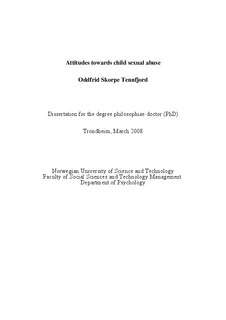| dc.contributor.author | Tennfjord, Oddfrid Skorpe | nb_NO |
| dc.date.accessioned | 2014-12-19T14:41:17Z | |
| dc.date.available | 2014-12-19T14:41:17Z | |
| dc.date.created | 2008-02-19 | nb_NO |
| dc.date.issued | 2008 | nb_NO |
| dc.identifier | 123552 | nb_NO |
| dc.identifier.isbn | 978-82-471-7202-5 | nb_NO |
| dc.identifier.uri | http://hdl.handle.net/11250/270358 | |
| dc.description.abstract | The main purpose of the present thesis was to develop a measurement instrument aimed to reveal attitudes towards child sexual abuse, and to measure attitudes and associating personal, social and cultural factors among three different samples of Norwegian adults. Additional aims were to explore the relation between participants’ knowledge-seeking on the one hand, their experiences, attitudes and actual knowledge about abuse on the other hand.
Three studies are presented based on the same data material collected in Norway in spring 2004. Three samples were included in the survey: A sample of randomly selected adults between 18-67 years (n = 296). A sample of active Christians between 22-65 years (n = 125) and finally a sample of imprisoned child sexual offenders between 21-74 years (n = 36).
Study I was primarily concerned about the development and validation of a new measurement instrument, entitled Attitudes towards child sexual abuse (ACA). The scale consisted of four different attitudinal dimensions. A confirmatory factor analysis (CFA) confirmed the four-factor structure. The four dimensions were entitled 1) Acceptance and responsibility, 2) Fatalism, 3) Damages caused by abuse, and 4) Legal issues. The result showed that there were significant attitude differences across the samples. The differences were in the expected direction e.g. offenders reported more abuse-accepting attitudes than the random adults and active Christians, and men had more abuse-accepting attitudes than women. This confirms the discriminative properties of ACA. Furthermore, the factors hypothesized to be associated with attitudes towards abuse behaved as expected, e.g. high empathy was related to more averse attitudes. Conclusively, the scale was found to be valid and reliable.
Study II further investigated attitudes towards abuse and explored cultural, social and personal factors associated with these attitudes. The results showed that different factors were predictors of attitudes in the three samples. Empathy and normlessness were the best predictors of attitudes among the random sample of adults and the active Christians. The most significant predictors of attitudes among the prisoners were their view of women and femininity. This may imply that different intervention strategies should be chosen depending on the target group.
Study III aimed to explore attitudes towards and knowledge-seeking about child sexual abuse among the samples. It was hypothesized that those who seek more knowledge had more accurate knowledge about abuse, and that the difference in knowledge-seeking and attitudes were related to the respondents’ own experience with abuse. It was furthermore expected that both knowledge-seeking and attitudes were predictors of abusive behaviour. The results suggested that attitudes and knowledge-seeking differed across samples and gender. The active Christians had most aversive attitudes towards child sexual abuse and sought more knowledge about abuse than the comparing samples. The respondents who reported high knowledge-seeking seemed to have more knowledge of abuse as well. However, a more comprehensive measurement of both knowledge-seeking and actual knowledge is recommended in future studies. Knowledge-seeking was related to both direct and indirect experience, e.g. victims of abuse had higher knowledge-seeking compared to non-victims and those who knew a victim had higher knowledge-seeking than those who did not know a victim. Abusive behaviour was predicted by attitudes, gender and sample. Knowledge-seeking did not predict abusive behaviour.
Taken together, the three studies showed that the hypothesized attitudinal differences between the three samples, were confirmed. Furthermore, the expected relation between attitudes on the one hand and social, cultural, and personality factors and knowledge-seeking on the other hand, was supported. The result as a whole may serve as a guide to interventions aimed to prevent abuse. | nb_NO |
| dc.language | eng | nb_NO |
| dc.publisher | Fakultet for samfunnsvitenskap og teknologiledelse | nb_NO |
| dc.relation.ispartofseries | Doktoravhandlinger ved NTNU, 1503-8181; 2008:63 | nb_NO |
| dc.relation.haspart | Tennfjord, Oddfrid Skorpe. Prediction of attitudes towards child sexual abuse among three different Norwegian samples. Journal of Sexual Aggression. 12(3): 245-263, 2006. | nb_NO |
| dc.title | Attitudes towards child sexual abuse | nb_NO |
| dc.type | Doctoral thesis | nb_NO |
| dc.contributor.department | Norges teknisk-naturvitenskapelige universitet, Fakultet for samfunnsvitenskap og teknologiledelse, Psykologisk institutt | nb_NO |
